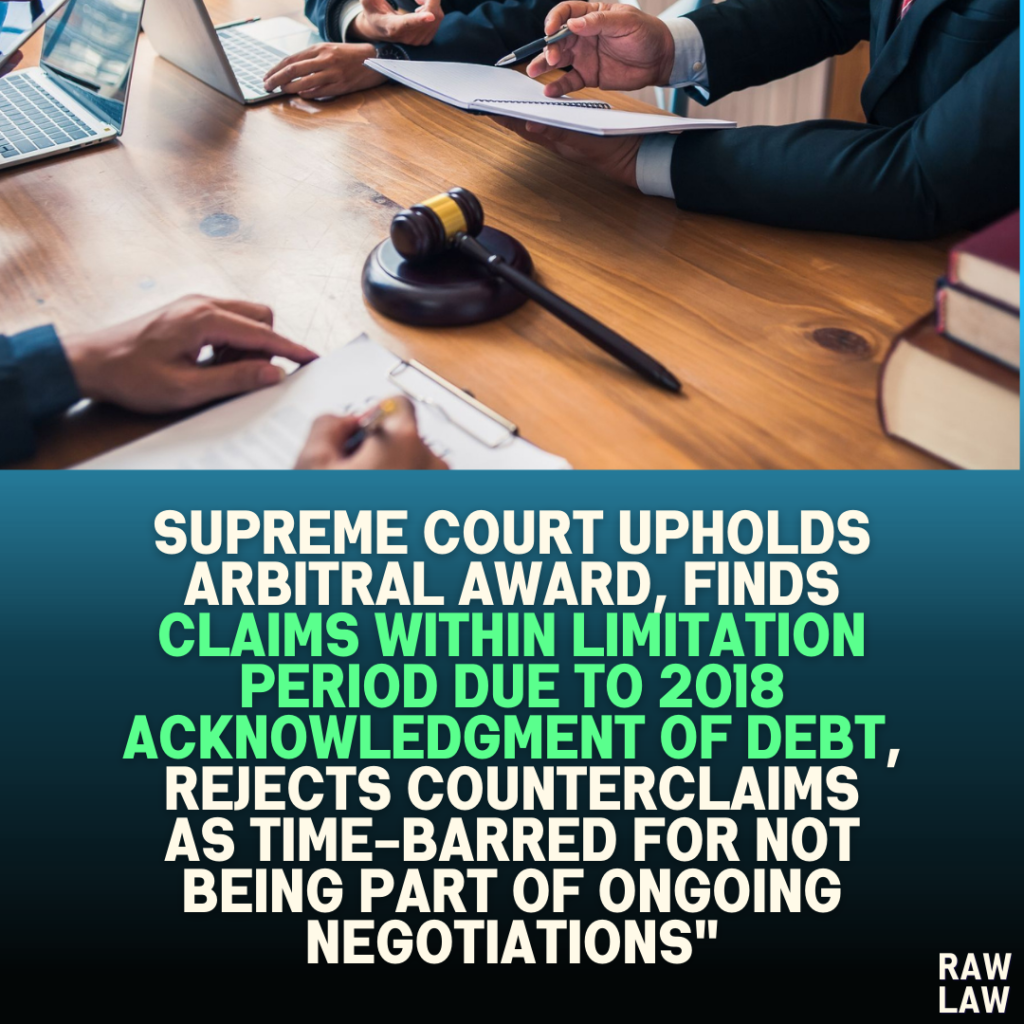Court’s Decision:
The Supreme Court dismissed the appeals filed by OPG Power Generation Pvt. Ltd. and Gita Power and Infrastructure Pvt. Ltd., upholding the arbitral tribunal’s award in favor of Enexio Power Cooling Solutions Pvt. Ltd. The tribunal had awarded Enexio ₹6.11 crores plus interest for its claims regarding unpaid contractual dues, while rejecting OPG’s counterclaims for liquidated damages and customs duty. The Court rejected the appellants’ arguments that Enexio’s claims were barred by limitation and found no merit in OPG’s counterclaims.
Facts of the Case:
OPG Power Generation entered into a contract with Enexio Power Cooling Solutions to design, supply, and erect an air-cooled condenser unit (ACC) for a 160 MW thermal power plant in Gummidipoondi, Tamil Nadu. Disputes arose when OPG withheld payment, citing delays and the resulting imposition of liquidated damages, as well as customs duties that had been deducted. Enexio filed a claim for an outstanding principal amount of ₹6.75 crores. The arbitral tribunal awarded Enexio ₹6.11 crores, rejecting OPG’s counterclaims related to liquidated damages and customs duties.
The appellants challenged the arbitral award before the Supreme Court, asserting that the claims were time-barred and that the tribunal applied different standards when considering the claims and counterclaims. The appellants also contended that Gita Power should not be held jointly and severally liable for the contract that was signed between OPG and Enexio.
Issues:
- Whether Enexio’s claims were barred by the statute of limitations.
- Whether OPG and Gita Power’s counterclaims were improperly dismissed as time-barred.
- Whether Gita Power, the parent company of OPG, could be held jointly and severally liable for the payment.
Petitioner’s Arguments:
OPG and Gita Power argued that the claims were barred by limitation since the arbitration was initiated more than three years after the completion of work. They further contended that the arbitral tribunal applied inconsistent standards regarding limitation for the counterclaims and that Gita Power should not be held liable for OPG’s contractual obligations.
Respondent’s Arguments:
Enexio argued that the claims were not time-barred as the parties continued to engage in negotiations until 2018, which extended the limitation period. It also maintained that Gita Power, as the holding company, was actively involved in the contract and should be held jointly liable for the dues.
Analysis of the Law:
The Supreme Court analyzed the case under the provisions of the Limitation Act, 1963, particularly Section 18, which provides that a fresh limitation period begins if there is an acknowledgment of the debt. The Court found that a meeting held in April 2018, during which OPG Power acknowledged its outstanding liabilities to Enexio, constituted such an acknowledgment, thereby extending the limitation period for Enexio’s claims. The Court further noted that the tribunal had appropriately rejected OPG’s counterclaims as time-barred, as they were not part of the ongoing discussions and were raised belatedly.
Precedent Analysis:
The Court referred to relevant precedents on limitation and the application of Section 18 of the Limitation Act. It emphasized that claims related to ongoing negotiations or where an acknowledgment of debt occurs may extend the statutory limitation period. The Court also reaffirmed that an arbitral award cannot be set aside on the grounds of an error in the law unless the error amounts to a violation of public policy or the fundamental principles of justice.
Court’s Reasoning:
The Supreme Court found that the arbitral tribunal’s application of the Limitation Act was correct and consistent with the facts. The Court agreed with the tribunal’s finding that OPG’s acknowledgment of its outstanding liabilities during the 2018 meeting extended the limitation period for Enexio’s claims. Furthermore, the Court upheld the tribunal’s decision to reject the counterclaims raised by OPG and Gita Power as time-barred, given that they were not discussed during the ongoing negotiations.
The Court also determined that Gita Power, the parent company of OPG, was rightly held jointly and severally liable for the outstanding payments, as both companies acted together as a single economic entity throughout the execution of the contract.
Conclusion:
The Supreme Court dismissed the appeals of OPG Power and Gita Power, affirming the arbitral award in favor of Enexio Power Cooling Solutions. The Court found that Enexio’s claims were within the limitation period due to the acknowledgment of debt in the 2018 meeting, and OPG’s counterclaims were time-barred. The Court held that Gita Power was jointly and severally liable with OPG for the payments owed to Enexio.
Implications:
This judgment reinforces the application of Section 18 of the Limitation Act in arbitration disputes, emphasizing the importance of acknowledgment of debt in extending the limitation period. The ruling also clarifies the principle of joint and several liability when multiple entities act as a single economic entity, even if only one is directly involved in the contract. The decision reaffirms the limited scope of judicial interference with arbitral awards under the Arbitration and Conciliation Act, 1996.




Pingback: JK and Ladakh HC Upholds Status Quo on Disputed Temple Land, Stating it was Necessary to Protect the Subject Matter of the Suit Until a Final Decision on Interim Applications - Raw Law
Pingback: Uttarakhand High Court Orders Thorough Investigation in Case of Alleged Hate Crime Leading to Death Amid Inter-Community Relationship Dispute - Raw Law
Pingback: Chhattisgarh High Court Grants Bail to Applicant Arrested for Possession of Illicit Liquor: Balances Pretrial Detention, Prior Acquittal, and Stringent Bail Conditions - Raw Law